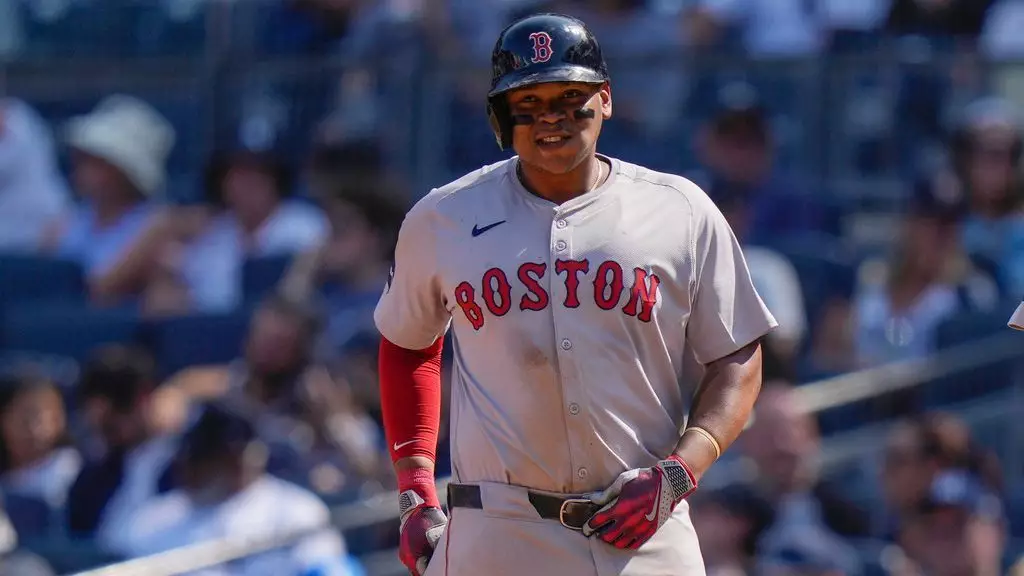In the world of professional baseball, position changes can dramatically affect a player’s performance and morale. Rafael Devers, the Boston Red Sox’s designated hitter (DH), has made it unequivocally clear that he is not interested in filling in as first baseman, despite the unfortunate injury to Triston Casas. This situation presents an insightful case that explores the dialogue between management decisions and player identity in the ever-evolving landscape of Major League Baseball.
The Weight of Expectations
When the Red Sox approached Devers about stepping into a new role, they weren’t merely asking a player to switch positions; they were influencing his professional identity. Devers transitioned from third base to DH prior to the season after the team acquired Alex Bregman. While versatility is a highly valued trait in players, the ramifications of such decisions necessitate consideration of a player’s comfort zone and historical performance. Devers’s reluctance to switch positions again underscores a critical aspect of the sport—players thrive when they concentrate on specific roles to maximize their talents.
Devers made it clear that he has already been through the turmoil of adjusting to a new position. By stating, “They told me to put away my glove,” he implied that he was promised stability in his current role. This kind of reassured environment is pivotal for any athlete’s success; when players are forced to scramble between positions, it can fracture their confidence and severely impact their performance.
A Player’s Perspective
During his recent media interaction, Devers expressed frustration and skepticism about the management’s decisions. He believes that the organization must take responsibility for filling the void left by Casas instead of relying on him to navigate a challenging transition. His words—“Now, they should do their jobs essentially and hit the market and look for another player”—reflect a strong opinion that resonates beyond his personal situation. It highlights a broader expectation that players should not be seen merely as interchangeable parts but rather as athletes with specialized skills honed over years of hard work.
With Devers’s substantial track record, including three All-Star selections, it’s evident he understands the business and the psychology of the game. His suggestion that management “hit the market” speaks to a fundamental respect for the team dynamics and the importance of finding the right fit for a struggling position, rather than expecting a powerhouse like himself to juggle multiple roles.
Boundaries and Team Dynamics
The conversation between Devers and Craig Breslow, the Red Sox chief baseball officer, illustrates the intricate balance teams must strike between management’s operational strategies and the players’ perspectives on professional expectations. Devers acknowledges Breslow’s experience in the sport, indicating that he should understand the complexities associated with position changes. The dialogue surrounding Devers’ role becomes a study in boundaries—what is reasonable for management to expect, and where should players draw the line in the face of organizational demands?
Devers’s stance raises a pertinent question: Should management listen closely to the sentiments of their athletes? The psychology of players can be as important as their physical abilities when it comes to on-field opportunities. The Red Sox’s insistence on leveraging Devers in various roles could lead to resentment and decreased performance, a risk no team should be willing to take—especially with a talent like Devers.
The Bigger Picture
Navigating the demands of a competitive sport like baseball requires shrewd decision-making from management, but it also necessitates an understanding of the human element involved. For every position change, there are layers of emotional and psychological ramifications that can disrupt team harmony. While flexibility is a desirable trait, the Red Sox must tread carefully and respect Devers’s boundaries as a player who has dedicated himself to excelling in his current role.
The situation surrounding Rafael Devers serves as a reminder of the sometimes overlooked dynamics between management and players. In a league that’s constantly evolving, finding the right balance between operational needs and player well-being is crucial. Designated hitters like Devers must have the clarity to focus on their game. His steadfastness in refusing another position switch could set a precedent for others in similar situations, advocating for a culture where players’ voices are not only heard but also valued.

